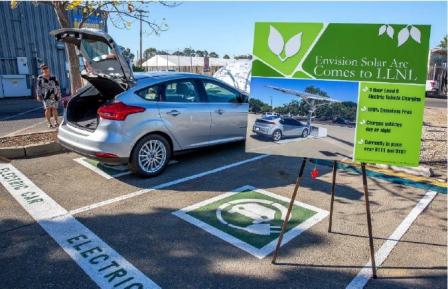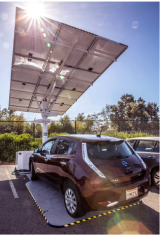2019 National Federal Green Challenge Award Winners
Recognition is a key element of the EPA’s Sustainable Materials Management Program and the Federal Green Challenge (FGC). FGC awards this year are data driven awards, given in the five target areas of Waste, Electronics, Purchasing, Water and Transportation, are based on the greatest percentage of change over the previous year.
The 2019 FGC awards recognize the achievements of participating facilities in Fiscal Year (FY) 2018. In FY18, 334 federal facilities took steps to improve efficiency, save resources and reduce costs as part of the Challenge. Participants saved around $37 million across natural gas, fuel oil, paper purchasing, water and municipal solid waste (MSW) categories.
Across five of the main target areas, we are pleased to recognize the following FGC participants for their significant efforts in improving the sustainability of their facilities and for their leadership in reducing the environmental footprint of federal government activities, which saves taxpayer dollars and conserves energy.
Electronics
The Department of Energy, East Tennessee Technology Park, Oak Ridge, Tennessee
The East Tennessee Technology Park (ETTP) reduced its carbon footprint through electronics purchasing, power management and electronics recycling. In 2018 the facility purchased 859 Electronic Product Environmental Assessment Tool (EPEAT) certified gold level registered equipment. One hundred percent of those purchases are EPEAT Registered. ETTP is currently tracking the energy use of 100 percent of its computer and monitors by having power management enabled impacting 3,243 units. In terms of recycling, ETTP recycled 16.20 tons of electronics equipment to a third party certified recycler in 2018.
The Drug Enforcement Agency, Southeast Laboratory, Miami, Florida
The Drug Enforcement Agency (DEA) Southeast Laboratory incorporates sustainability in its day to day operations through waste reduction, green purchasing and electronics recycling. The facility purchased 27 units of EPEAT certified gold level registered equipment and enabled power management monitoring on 98 percent of those units.
Purchasing
The Drug Enforcement Agency, Southeast Laboratory, Miami, Florida
The DEA-Southeast Laboratory incorporates sustainability in its day to day operations through waste reduction, green purchasing and electronics recycling. The facility has in place a Green Purchasing Plan and an Integrated Post Management Plan to facilitate green purchasing. The facility purchased 100 pounds of printer and copier paper that contained 50 percent recycled content.
Department of Veterans Affairs, Manchester Medical Center, Manchester, New Hampshire
Manchester Veterans Affairs Medical Center (VAMC) achieved a 23 percent reduction in copy paper use from 2017 to 2018. During this time the facility defaulted its existing multifunctional printers to print duplex and enabled electronic meeting capabilities instead of printing for all of its conference rooms. Extensive efforts were also made to streamline scanning and integration of patient health records into the electronic records management system. The Manchester VAMC put into place its new Environmentally Preferable Purchasing and Pollution Prevention Policy at the end of 2017 and has long worked to implement waste minimization and other sustainability measures. This effort is in keeping with the VA mission to deliver excellent healthcare to our nation’s veterans by operating in such a way as to protect the health of, not only the patients, employees, and visitors, but also the environment.
Transportation
Department of Veterans Affairs, Atlanta Veterans Affairs Medical Center, Decatur, Georgia
Atlanta VA Medical Center realized significant greenhouse gas reductions by incorporating electric, hybrid and alternative fuels vehicles into its operations. Currently the facility has a combined 356 electric, hybrid, and alternate fuel vehicles. The Atlanta VA employees participate in a ride share program that consists of 50 vans and SUV’s. In FY 18 25,945 public transit miles were traveled, 5000 bicycle miles traveled with over 10,145 miles avoided through teleworking. In FY 18 this program saved employees $964,401 and reduced carbon emissions by 2,308,346 pounds. This freed up 128 parking spaces for the veterans.
Department of Energy (in collaboration), Lawrence Livermore National Laboratory, Livermore, California
 Through a collaboration with the Department of Energy (DOE), Lawrence Livermore National Laboratory (LLNL) launched a government-owned electric vehicle (EV) program, helping the Laboratory and its employees to be proactive in reducing emissions and meeting sustainability goals, which included increasing the size of the Laboratory’s electric vehicle fleet and replacing gas-powered vehicles. In implementing the EV program LLNL used innovative methods and cutting-edge technology that is transferable to other DOE facilities.
Through a collaboration with the Department of Energy (DOE), Lawrence Livermore National Laboratory (LLNL) launched a government-owned electric vehicle (EV) program, helping the Laboratory and its employees to be proactive in reducing emissions and meeting sustainability goals, which included increasing the size of the Laboratory’s electric vehicle fleet and replacing gas-powered vehicles. In implementing the EV program LLNL used innovative methods and cutting-edge technology that is transferable to other DOE facilities.
The Laboratory added Level II charging stations and two Level II solar-powered charging units to service a newly deployed fleet of government-owned electric vehicles provided by DOE, also enhancing the Laboratory's current personal electric vehicle program that benefits many LLNL commuters.
The government EV program came to be through many discussions between DOE and the Laboratory's Fleet Management Program. DOE recognized LLNL's successful personal EV charging program and determined LLNL would be a perfect site to pilot a program and introduce a fleet of 10 government-owned electric vehicles, replacing 10 gas-powered vehicles. LLNL was also the only DOE site to show a strong interest in EVs by committing to incrementally replace its fleet of 80 sedans with EVs. The first 10 electric vehicles were received in 2017 and later tripled with an additional 20 vehicles received in 2018.
In preparation for the new fleet, the Laboratory needed a sustainable electric vehicle charging infrastructure. Wanting to embrace the newest advances in charging technology, LLNL spent several months researching available charging systems from non-solar, solar, wireless, and network solutions. LLNL ultimately selected an industry leader, ChargePoint and a solar innovator, Envision Solar. Contracting with ChargePoint, the Laboratory built a Level II charging station. The new station, which was completed October 1, 2017, can charge EVs in half the time as a standard Level I charging station. To supplement this effort, the Laboratory also acquired two portable Level II solar-powered charging units from Envision Solar that were deployed on site in mid-October, providing a clean, green, impact-free charging system for government and employee personal vehicles. These companies were selected because they provide usage data to estimate greenhouse gas savings. In 2018, LLNL installed eight more Level II charging stations and purchased two additional solar-powered units.
Greenhouse gas emission reductions, since the government electric vehicles were deployed in October 2017 through the end of 2018, are estimated at 10.5 metric tons of carbon dioxide equivalent.
Waste
The Drug Enforcement Agency, Southeast Laboratory, Miami, Florida
The DEA-Southeast Laboratory incorporates sustainability in its day to day operations through waste reduction, green purchasing and electronics recycling. The facility recycled 4.11 tons of recyclable material.
Water
Department of Veterans Affairs, Atlanta Veterans Affairs Medical Center, Decatur, Georgia
Atlanta VA Medical Center main campus sits on a 26-acre campus and includes 19 clinics throughout metro Atlanta. The Atlanta VA Medical Center, Atlanta GA, reduced greenhouse gases by recycling water, and decreasing its water consumption. The facility reduced its consumption of water by 1,000,000 gallons by installing new urinals and toilets. All urinals in the facility are now waterless and toilets low flow. The facility recycled 4,682 gallons of water and captured 350 gallons of rainwater which was utilized for landscaping. The facility also utilizes a food pulper which saves 4682 gallons of water per year. In the future the facility plans to capture its grey water as part of a green roof project on one of its buildings.

